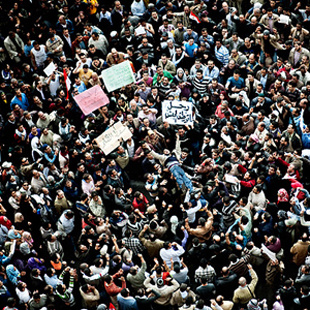The Elimination of Radicals from the Equation

 IRD: The Arab world has been undergoing serious developments in the past few months. In your opinion how can these developments affect the historical conflicts between Israel and the Arabs?
IRD: The Arab world has been undergoing serious developments in the past few months. In your opinion how can these developments affect the historical conflicts between Israel and the Arabs?SZ: I think the developments we are witnessing in the Middle East and North Africa will prepare the grounds for a closer Arab-Israeli relationship. In other words, the spread of democracy and democratic approaches in the Arab world will bring Israel and the Arabs closer together. The reason behind this is that the lack of democracy in the Arab world, and in Islamic countries in general, has provided the opportunity for extremist groups to gain power and influence.
The influence and power of these groups like Hamas, Hezbollah, and Al-Qaeda has caused panic and fear on the Israeli side. In several elections in the past few years we saw that the radical right-wing parties were elected. In other words, these groups have been able to take advantage of the radical atmosphere in the Middle East and push themselves from the margins of political life to the center. And the Israeli public has taken refuge in radical groups from the fear of extremism in their neighboring countries.
However, if the developments in the Arab world move towards democracy, a civil society, free elections, freedom of speech, media, and freedom of thought, the power of radical groups will wither and moderates will attract the attention of the public. In other words, if people in Tunisia, Egypt, Libya, Bahrain, and Syria achieve the demands they have protested for, radical trends like Hamas, Hezbollah, and Al-Qaeda will be removed from the leadership they now posses in the Muslim world.
These trends were created in the Muslim world due to the dictatorship and despotism in these countries. For example, in Egypt, Jordan, and Syria, Salafi trends and the Muslim Brotherhood are much more active compared to other countries. In addition, the oppression of people by the Israelis in the occupied territories or in the Gaza strip has caused the formation of Salafi trends in the Gaza strip.
The formation of radical thoughts and trends is the result of abnormal social conditions. However, in contrast, where there is democracy, there’s no sign of oppression or despotism. For example, in countries like Turkey or Malaysia, radical groups have no public ground. But if the military conducts a coup in Turkey and topples Erdogan’s government, the context for the formation of radical groups will be ready. Currently, the situation is not set for the growth of radicalism in this country, and there’s no need for it either.
Therefore the process of democratization will lead to more understanding between the Arabs and the Israelis. After 60 years of conflict, it is possible that democracy will bring the Arabs and Israelis closer together.
IRD: Can we assess the recent Fatah and Hamas accord in this context?
SZ: Exactly. The now close relationship between Fatah and Hamas, who were tied up in conflicts, confirms this issue. Why did they resolve their problems so quickly? Because the leaders of Fatah and Hamas have realized that the Palestinian people will also demand democracy, freedom of the press, and political parties. Therefore they formed a coalition immediately.
In fact, Hamas has realized that the wave of democracy that has taken the Arab world cannot leave the Gaza strip untouched. Since Hamas is a popular group it has reached this conclusion, and Fatah has also realized that this conclusion is inevitable.
Due to the new situation in the Middle East both sides have stepped down from their ideals and totalitarian wishes and come closer together.
Their relation has become so intimate that Ismail Haniyeh has announced that any strategy and tactic employed by Hamas is confirmed by Fatah as well. Therefore, some of the radical newspapers in our country blamed Hamas for compromising with Fatah.
Unlike those who believe that these developments will end in the death and decline of Israel and the US, I believe that these changes will cause the creation of a Palestinian state and the stabilization of Israel as well.
IRD: How can these developments influence Israel?
SZ: Due to its democratic structures Israel does not need any civil movement. However, the right wing and radical religious parties will lose their impetus in Israel.
In contrast, the left will become more prominent in Israel. The coming to power of people like Netanyahu and Lieberman is the result of the insecurity felt by the Israelis from the Arab world. When Israeli people witness movements coming to power in countries like Egypt, Syria and Palestine, there will be no need for them to vote for radicals. Therefore, I believe we will witness a fundamental development in Israel in the future. In other words, secular, liberal and democratic trends will gain the most seats in the parliament. Therefore, the context for a historical and permanent agreement between the Arabs and the Israelis will be achieved.

